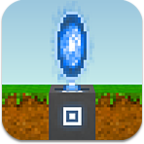Water: Difference between revisions
>McClaw |
>McClaw |
||
| Line 8: | Line 8: | ||
Water will flow over drop-offs and "slosh" across the top of blocks. This can cause unexpected problems as water will dislodge placed [[Items|items]] such as [[Ladder|ladders]] or [[Oil Lantern|oil lanterns]], dropping them for pick-up by the next Blockhead that passes them. | Water will flow over drop-offs and "slosh" across the top of blocks. This can cause unexpected problems as water will dislodge placed [[Items|items]] such as [[Ladder|ladders]] or [[Oil Lantern|oil lanterns]], dropping them for pick-up by the next Blockhead that passes them. | ||
Whether water will flow between two adjacent partially filled blocks appears to be determined by comparing their relative levels. If there is insufficient difference, there will be no flow. This can result in a very gentle, descending gradient across long expanses. | |||
There have been no reported encounters with ongoing water flows (streams or rivers) or ocean currents. | There have been no reported encounters with ongoing water flows (streams or rivers) or ocean currents. | ||
Revision as of 16:26, 20 March 2013
Water is a fluid block that can be a barrier to travel or a useful resource.
Where Found
Water occurs naturally on the surface of a generated world in the form of ponds, lakes, and oceans. It can also spawn underground.
Flowing
It's possible for water to flow from one block to another, either when an adjacent block is removed, a block is added in space occupied by water, or when a bucket of water is emptied. Water will seek to fill the lowest available space but will not decrease in volume doing so, which can result in spaces being partially filled with water.
Water will flow over drop-offs and "slosh" across the top of blocks. This can cause unexpected problems as water will dislodge placed items such as ladders or oil lanterns, dropping them for pick-up by the next Blockhead that passes them.
Whether water will flow between two adjacent partially filled blocks appears to be determined by comparing their relative levels. If there is insufficient difference, there will be no flow. This can result in a very gentle, descending gradient across long expanses.
There have been no reported encounters with ongoing water flows (streams or rivers) or ocean currents.
Harvesting
It's not possible to pick up water directly.
Using a bucket on water will change the bucket into a "bucket of water." This can be done on even partially filled spaces if the water level is high enough. The minimum level of water that can be picked up in a bucket is believed to be 20% (one fifth) of a block.
Free-standing water in an area experiencing sufficient cold (such as falling snow) may freeze into ice. Under warmer conditions, ice may melt into water.
Drowning
A Blockhead who has its head fully immersed in water will suffer from a lack of air and begin reducing their breath bar.
Uses
Water cannot be used directly for crafting, but is needed for some craftings in the form of a bucket of water.
Kelp cannot be planted in a block that isn't under sufficient water.
Notes
Free-standing water that's close enough to magma will begin boiling, giving off puffs of steam.
Due to some quirks of how it's implemented, it's possible to generate water in two ways:
- Water that partially fills a space will freeze into a full block of ice, which can then melt into a full block of water.
- Causing water to spill into two or more open blocks may allow each partially filled space to be picked up by a bucket, which when emptied will produce a full block of water.
Gallery
-
Water boils near magma
